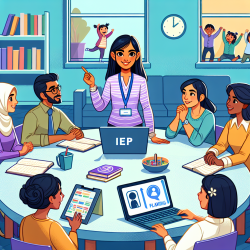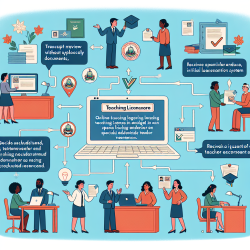As school social workers, you are at the forefront of fostering environments where every student can thrive, especially those who require Individualized Education Programs (IEP). The IEP planning and meeting process is crucial in setting the stage for student success, and with the right approach, you can empower not only the students but also yourselves, feeling self-actualized in your crucial role. This guide aims to equip you with strategies to navigate IEP planning and meetings with confidence, ensuring every child receives the support they need to flourish.
Understanding the IEP Process
The IEP process is a collaborative effort involving teachers, parents, administrators, and you, the school social workers. Your role is pivotal in understanding and advocating for the student's social, emotional, and academic needs. A well-structured IEP meeting can set a positive trajectory for students requiring special education services, including those who may benefit from online speech therapy.
Preparation is Key
Before the IEP meeting, thorough preparation is essential. Familiarize yourself with the student's academic history, previous IEPs (if applicable), and any assessments or reports from educators and therapists. This knowledge will enable you to contribute effectively to the meeting and advocate for the student's needs.
- Gather input from all stakeholders, including teachers, parents, and the students themselves, to get a holistic view of the student's strengths and challenges.
- Consider how online speech therapy or other specialized services could be integrated into the IEP to support the student's learning and development.
Facilitating Effective IEP Meetings
As a school social worker, you play a significant role in facilitating IEP meetings. Your skills in communication and mediation can help ensure that the meeting is productive and focused on the student's best interests.
- Begin by setting a positive tone, emphasizing the collaborative nature of the meeting and the shared goal of supporting the student's success.
- Encourage open dialogue, allowing all participants to share their perspectives and concerns. Your expertise in active listening and empathy can help navigate any challenging discussions.
- Highlight the potential benefits of incorporating online speech therapy or other specialized services into the IEP, ensuring that all options for supporting the student are considered.
Advocating for Student Needs
Your advocacy is crucial in ensuring that the IEP truly reflects the student's needs. This involves not only speaking up during the meeting but also following up to ensure that the agreed-upon services and supports are implemented effectively.
- Be clear and assertive about the student's needs, using evidence from assessments and observations to support your recommendations.
- Work closely with parents and guardians, empowering them to advocate for their child's needs both during the meeting and in follow-up discussions.
Embracing Technology: The Role of Online Speech Therapy
In today's educational landscape, technology plays a pivotal role in supporting students with special needs. Online speech therapy, for instance, offers a flexible and effective way to provide speech and language services to students, regardless of their geographical location or the availability of local therapists.
- When discussing the student's IEP, consider how online speech therapy could address specific goals related to communication, language development, and social skills.
- Share success stories and research that highlight the effectiveness of online therapy services, helping to alleviate any concerns about incorporating technology into the student's IEP.
Conclusion
As school social workers, your role in the IEP planning and meeting process is invaluable. By preparing thoroughly, facilitating effective meetings, advocating for student needs, and embracing innovative solutions like online speech therapy, you can ensure that every student has the support they need to succeed. Remember, your efforts not only impact the students you serve but also contribute to your own journey of professional and personal growth, leading to a sense of self-actualization in your critical work.
Let's continue to work together, leveraging our unique skills and resources, to create inclusive educational environments where all students can thrive.










